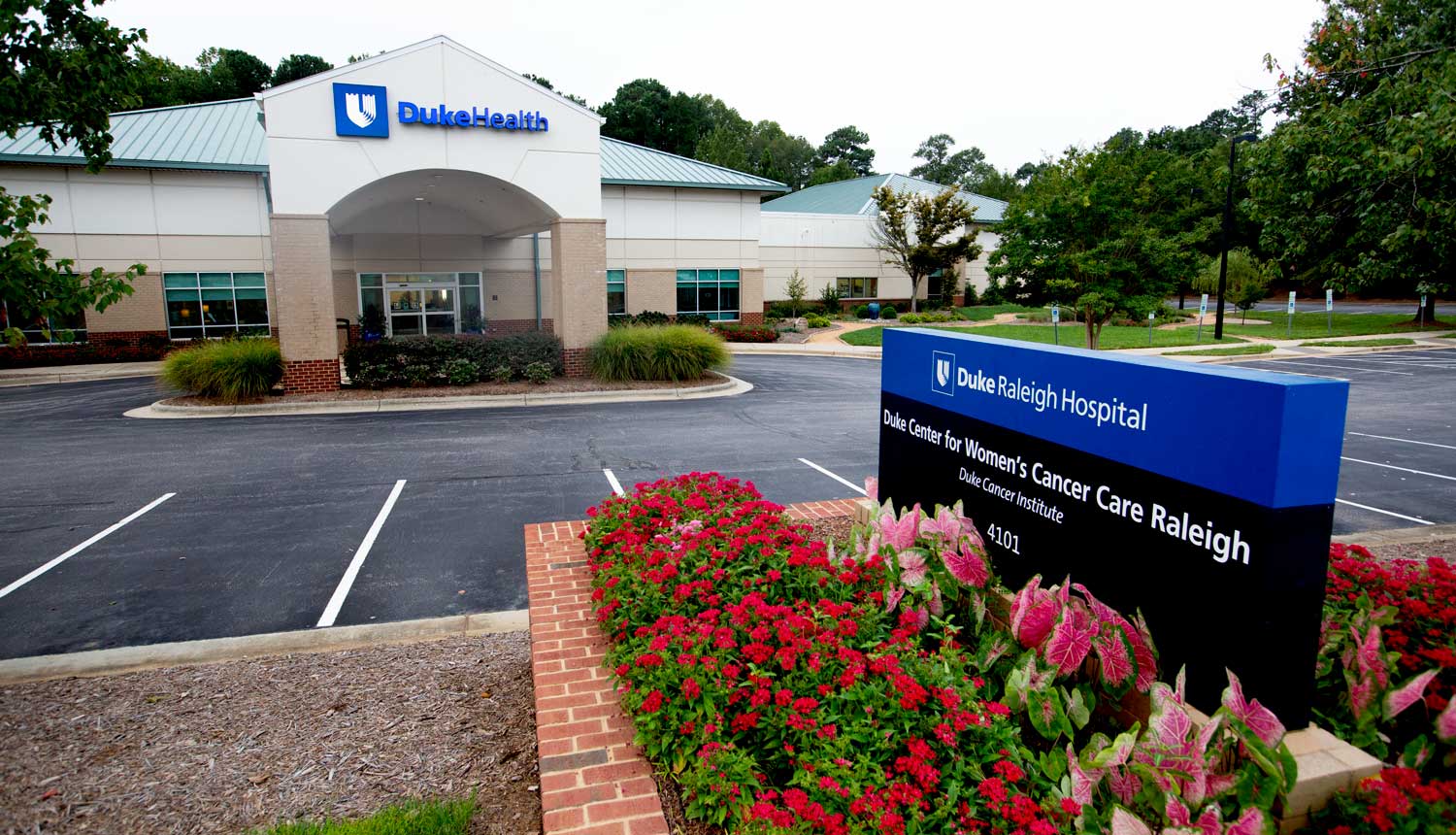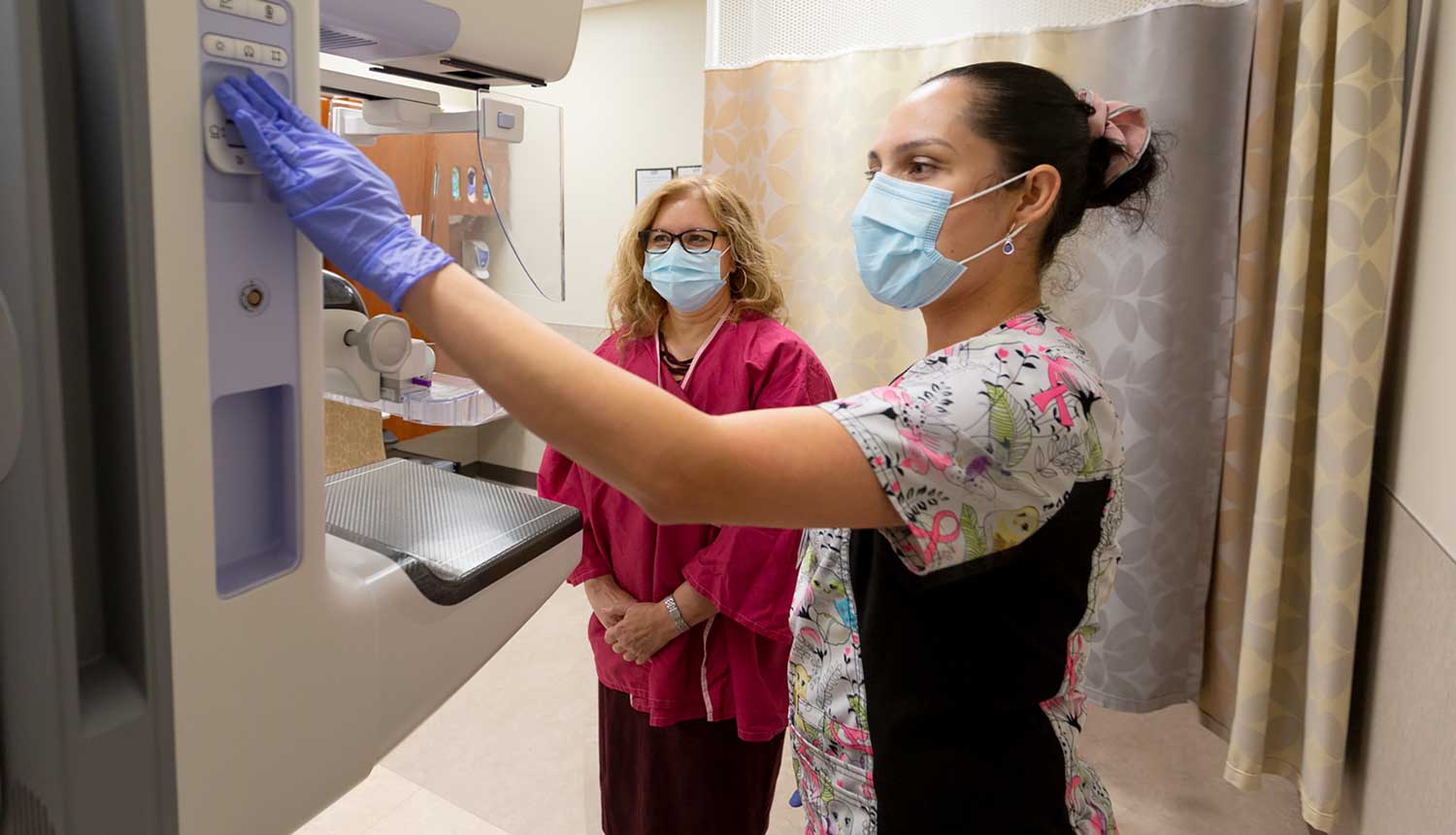What to Expect at Your Appointment
Welcome
As a new patient at Duke Women’s Cancer Center Raleigh, you may have questions as you prepare for your first consultation or treatment appointment. Our goal is to make your visit as stress-free as possible so you can focus on what’s important -- your health. The information below provides details on your first visit, including how to prepare, what to expect, and who you’ll meet.
When You Arrive
Parking
Parking is free and conveniently located just steps from our clinic.
Public Transportation
Plan your trip to Duke Women's Cancer Care Raleigh through GoRaleigh bus routes 4 and 27. The closest bus stops are Blue Ridge Rd at Macon Pond Rd and Blue Ridge Rd at Rex Way. If you have trouble accessing these routes, visit GoWake Access to check if you are eligible for Wake County’s accessible transit program.
Checking In
When you arrive, you will check in and register at the front desk. You will be asked to show your photo ID and insurance cards and pay your required co-pay(s).

Staying Comfortable at Your Appointment
Appointment Length
Your first visit may last several hours. In addition to meeting with providers, this may include time to complete lab tests, additional imaging, and procedures such as a biopsy.
What to Bring
For your comfort, you are encouraged to bring a sweater or light jacket, reading material, a laptop or mobile device, and a pen and paper to take notes. Free wireless internet service is available throughout the building. Bring all your medicines, vitamins, and supplements in their original containers, as well as your insurance information. You're welcome to bring a snack or beverage.
A support person may accompany you to your appointment to participate in any discussions. They may hear something you missed, think of different questions to ask or assist by taking notes. Additional family members may join your appointment via phone or video.
Please note that visitor restrictions are in effect.
Screening and Diagnostic Testing
You may come to our clinic for one or more of the following tests. They may be performed to screen for cancer, to make a diagnosis, or to pinpoint the stage and location of your cancer.
- Screening and diagnostic 3D mammograms (digital breast tomosynthesis)
- CT scans for evaluation and treatment planning
- Ultrasounds
- Biopsies, including ultrasound and stereotactic biopsies
Our surgeons also evaluate abnormal mammography results and provide second opinions.

Your Cancer Care Team
Your team will include many different health care providers. You will be seen by a cancer specialist who will discuss your diagnosis in detail, treatment options, and next steps. In most cases, subsequent visits are shorter; a nurse will review your medication and symptoms. You will then see either your cancer specialist or a nurse practitioner or physician assistant who works with your cancer specialist. Here’s an example of some of the people you will meet during your appointments.
Surgical Oncologist
These cancer specialists evaluate masses and abnormal imaging to start a plan for your cancer treatment. They offer lumpectomy, sentinel node mapping, hidden scar surgery, oncoplastic techniques, and skin and nipple-sparing mastectomies. The surgeon will help set up the plan for your cancer treatment and coordinate with medical and radiation oncologists. Surgical consultations and follow up visits take place in the office. Any surgery takes place at the hospital.
Medical Oncologists
These cancer specialists manage chemotherapy, immunotherapies, and targeted treatments when they are part of your cancer treatment plan.
Radiologist
You may meet with a radiologist if you have a diagnostic mammogram or ultrasound that requires a biopsy.
Radiation Oncologists
Radiation oncologists use intense beams of energy (X-rays) to destroy cancer cells. Targeted and shortened courses of radiation therapy may be used as a standalone treatment or in combination with other therapies in order to shrink tumors before or after surgery. Our radiation oncologists use techniques to minimize radiation exposure to your normal healthy tissues.
Plastic and Reconstructive Surgeons
If you desire and are eligible for breast reconstruction, our board-certified plastic and reconstructive surgeons will help you understand your options and recommend the most appropriate procedure. Your surgical consultations and post-operative appointments take place in our office. All surgeries take place at a nearby Duke Health facility.
Palliative Care Specialist
Palliative care is available to meet the emotional, physical, and spiritual needs of you and your loved ones.
Oncology Nurse Navigator
A nurse navigator identifies barriers to care and connects you with resources. They ensure you have the information you need to make decisions and advocate for yourself. If you are interested in learning more, contact your healthcare team and ask what navigation services are available to you.
Nurse Practitioner and Physician Assistant
Nurse practitioners and physician assistants may participate in your cancer care throughout your journey, from your first consultation and helping you manage your symptoms, to when you are ready for long-term follow-up.
Registered Nurses and Certified Medical Assistants
A registered nurse will educate you and your family about your cancer and planned treatments. At each appointment, you will see the same nursing team. This approach gives you a consistent point of contact for questions and concerns that arise outside of the clinic. A certified medical assistant will help guide you through your clinic visit. Both roles are meant to support your clinical needs during each and every visit.
Genetic Counselors
A genetic counselor can explain and recommend genetic testing to determine your cancer risk. If you have already been diagnosed with breast cancer, ovarian cancer, or colon cancer, knowing whether this cancer is inherited can direct your treatment decisions. It may also affect your loved ones’ health in the future.
Other Team Members
You may also interact with family therapists, dietitians, psychologists, social workers, and other cancer-specific caregivers who support you during your cancer treatment. You may see a medical resident or fellow pursuing specialty training. They work closely with other members of your health care team. A financial care counselor can answer questions about billing and insurance.
Virtual Visits
It is possible that some follow-up visits may be virtual, including appointments after your surgery. This means you will meet with your cancer specialist using video on a computer or mobile device with a camera. This appointment may be with a nurse practitioner, physician assistant, or doctor. Typically, these appointments are for follow-up care or for people who live far from Duke Women’s Cancer Care Raleigh.